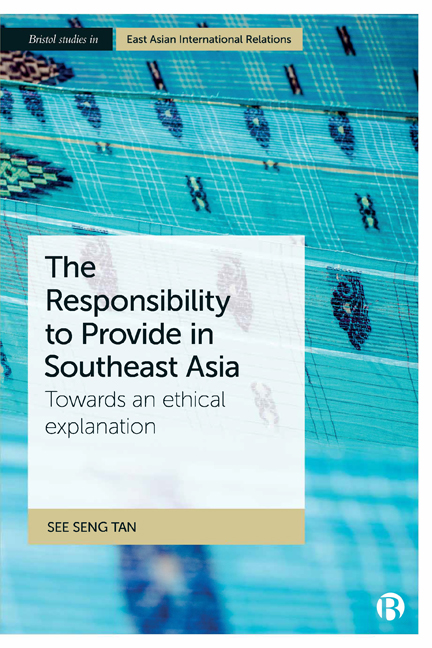Book contents
- Frontmatter
- Dedication
- Contents
- List of Tables
- List of Abbreviations
- Acknowledgements
- 1 Towards an Ethos of Responsibility in Southeast Asia
- 2 The Responsibility to Protect (R2P) and Responses from Southeast Asia
- 3 Towards a ‘Responsibility to Provide’ (R2Provide) in Southeast Asia
- 4 Institutionalizing Security Regionalism: Responsibility as ‘Response Ability’
- 5 Responsible Provision in HADR, Conflict Management and Human Rights
- 6 Towards the Responsible Management of Disputes in Southeast Asia
- 7 Communitarianism, Liberalism and the Limits of Responsibility in Southeast Asia
- 8 Levinas and the Responsibility to Provide in Southeast Asia
- 9 The Responsibility to Provide: Implications for the Region and Beyond
- Notes
- Bibliography
- Index
7 - Communitarianism, Liberalism and the Limits of Responsibility in Southeast Asia
Published online by Cambridge University Press: 02 March 2021
- Frontmatter
- Dedication
- Contents
- List of Tables
- List of Abbreviations
- Acknowledgements
- 1 Towards an Ethos of Responsibility in Southeast Asia
- 2 The Responsibility to Protect (R2P) and Responses from Southeast Asia
- 3 Towards a ‘Responsibility to Provide’ (R2Provide) in Southeast Asia
- 4 Institutionalizing Security Regionalism: Responsibility as ‘Response Ability’
- 5 Responsible Provision in HADR, Conflict Management and Human Rights
- 6 Towards the Responsible Management of Disputes in Southeast Asia
- 7 Communitarianism, Liberalism and the Limits of Responsibility in Southeast Asia
- 8 Levinas and the Responsibility to Provide in Southeast Asia
- 9 The Responsibility to Provide: Implications for the Region and Beyond
- Notes
- Bibliography
- Index
Summary
Introduction
Hitherto this book has explored the emergence in Southeast Asia of an incipient ethos of responsible provision, whose consolidation in the region remains hugely problematic and unsettled. It has sought to map out the material and conceptual contours and contents of the R2Provide as such in a number of distinct but interrelated domains that are ostensibly ‘non-military’. Yet as we have seen in the context of areas such as HADR and counterterrorism, Southeast Asian states rely on their military assets and resources frequently and regularly. In this chapter and the following one, the book turns its attention to the philosophical and normative foundations that hitherto underpin responsible sovereignty or sovereign responsibility in Southeast Asia. The focus here is on the ways in which communitarian and liberal approaches – which I shall treat as ‘rival’ or contending ethical explanations to Levinas’ ethics introduced in the next chapter – understand and advance their respective conceptions of sovereignty as responsibility in Southeast Asia. As noted in Chapter 2, the R2P is a concept with African roots but a liberal mien (Luck, 2008; Williams, 2009; Mabera and Spies, 2016). As such, some of the assumptions and expectations of the R2P run counter to the illiberalism that still characterizes much of Southeast Asian political and diplomatic life, even though economic liberalization is an established convention in the region, notwithstanding the protectionist proclivities of some Southeast Asian economies (Rahardja and Patunru, 2015). Although the Southeast Asian region has experienced a level of democratization, the persistence and prevalence of unresolved tensions and disputes over sovereignty among most if not all Southeast Asian states – among themselves as well as with external powers such as China – have both underscored for Southeast Asian states the continued relevance of the non-interference norm and the ‘sovereignty as right’ idea, and hindered their full acceptance of R2P. Indeed, developments such as the military coup which brought Thai army chief Prayut Chan-o-cha to power in Thailand in May 2014, Cambodian leader Hun Sen's actions against his political opposition and domestic media organizations (Pongsudhirak, 2017), the rise of President Rodrigo Duterte in the Philippines and his administration's brutal war on drugs and crime that – at least according to the human rights group Amnesty International – has reportedly caused more deaths than was the case during the Ferdinand Marcos years (Caro, 2017),
- Type
- Chapter
- Information
- The Responsibility to Provide in Southeast AsiaTowards an Ethical Explanation, pp. 127 - 152Publisher: Bristol University PressPrint publication year: 2019



